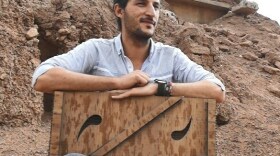AILSA CHANG, HOST:
Imagine unearthing your own time capsule. Would you open it up, or would you be nervous about revisiting your younger self? Photographer Ron Haviv wants to help you open up your time capsules. He's asking for old rolls of undeveloped film for a website he's building. The project is called Lost Rolls America.
Thank you for being with us, Ron.
RON HAVIV: My pleasure. Thank you.
CHANG: So what are you constructing with all these old photos?
HAVIV: Well, we're basically constructing a visual archive. I think that they are so many lost memories out there contained in these little rolls of film sitting in people's drawers, in kitchen cabinets, in boxes and so on that - it's becoming more and more difficult to find places to develop your film, where - we thought this would be a good time to kind of remind people, especially around the holidays. You're going home? Grab some of your film, and give it into the project. And we'll help you see some of your lost memories.
CHANG: OK, wait. So people send in their rolls of photos to you. You develop those photos. Then what happens?
HAVIV: Basically, people send in their film. Fujifilm is one of the sponsors of the project, so they'll develop and scan the film for free. We'll then upload it to a secure website that only you'll be able to see. You, the viewer, choose one or two images that not necessarily is the best photograph but is a photograph that means something to you. And then we have a questionnaire that people fill out, which is really dealing with their memory or lack of memory of that moment.
And in the end, I think we're going to have this kind of really amazing thing. It's like, literally, like, a kind of a visual StoryCorps. And by extension, this project also kind of talks about the end of the analog era and the entering of the digital age in that it's not possible, for the most part, for people, especially if they're taking photographs with their phone - you're always going to probably have, you know, the GPS coordinates. You're going to have the date. You're going to have the time. And if you run it through different programs, you'll have facial recognition. So this kind of idea about kind of not knowing what's on the film really ends with the analog era.
CHANG: Well, besides offering people a way to physically develop these old rolls of film, is there something else you're trying to achieve by helping people share these photos with strangers?
HAVIV: I think so. I think - you know, we not only narrate historical memory through imagery, but we also narrate our own personal histories with the aid of these images. And so the individual memories are offering points of connection to a broad public because there are so many similarities. And there's so many lovely stories that we've already seen that have come online of people talking about - like, for instance, one photographer found a photograph of his son having his first ice cream. It's an amazing, beautiful, like, loving-life kind of moment.
Another photographer found a photograph of her daughter when she was 6 years old and she'd just lost some teeth. And she had this amazing look of glee. She wrote in the piece with the photograph, like, her daughter's now 15 years old and she had forgotten what her daughter looked like with unbridled passion and enthusiasm. It was this kind of bittersweet memory.
CHANG: Ron Haviv is the photographer and creator of the Lost Rolls America program.
Thank you for joining us.
HAVIV: My pleasure. Thank you very much. Transcript provided by NPR, Copyright NPR.




